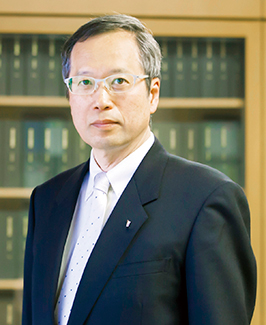Message from the President
Senshu University was founded in 1880. The University’s four founders—Nagatane Soma, Inajiro Tajiri, Tanetaro Megata, and Shigetada Komai—traveled to the U.S. to study at Columbia, Yale, Harvard and Rutgers Universities, respectively. After returning
to Japan, they founded Senshu Gakko (Senshu College, which later became the present Senshu University), seeking to give back to society by sharing what they had learned in the fields of economics and law. At the time, state-run colleges presented two
major hurdles for students—high tuition fees and requirements that students master Western languages and be familiar with Western texts. In Senshu Gakko’s Purposes for Establishment, the four founders made the significance of establishing the school very
clear: To remove these hurdles and widely recruit students with a strong desire to learn. Our founders’ mission was to provide professional education in the Japanese language more widely to foster the kind of talented people who would be able to support
the framework of our modern nation-state.

In the post-World War II era, the Cold War between the Eastern and Western Blocs lasted for 44 years, after which the international order shifted from a centralized model to a multipolar one. The level of turmoil present around the world has been on the rise still, as exemplified by the Russian invasion of Ukraine, various international confrontations and ethnic conflicts constantly transpiring, and religious clashes, cultural friction, and other disputes escalating to record levels in certain regions. In view of all this, we decided that Senshu University’s educational goal for the 21st century would be to ‘develop socio-intelligence’ in order to evolve as an institution of higher education and continue to thrive in the new era. It means we each need to acquire a capacity to recognize a whole range of issues that are arising in today’s society from a global perspective and to resolve them in a proactive manner. In pursuit of these objectives, the University has been actively creating new schools and academic departments as well as reorganizing existing ones so that its progress on the development of socio-intelligence can be better visualized and actualized. A series of new departments opened at Senshu University in recent years, starting off with the School of Human Sciences in 2010 followed by the inception of the Department of Business Design at the School of Business Administration, and the Department of Journalism at the School of Letters in 2019, all of which would put the University in a better position to cultivate the types of talent that would meet the needs of today’s society. In 2020, the University established the School of International Communication to train students to become Japanese language experts and improve their understanding of the international community. Furthermore, the University divided the School of Economics into three different departments in order to improve its overall effectiveness in developing talent that would be able to apply their specialized knowledge of economics to serve society. Then, after the inauguration of the Socio-Intelligence Data Science Education Program across all Schools in 2022, the University has started offering applied- and advanced-level courses in the Program from AY 2023, for which a suitable system has been laid down to promote the mastery of necessary skills by students so that they can continuously thrive in Society 5.0.
For the transformation of our University to be successful, campus improvement is essential. As our campus enhancement initiatives are constantly being planned and executed to meet the demands of the times, the Building No. 10 (140-Year Memorial Building) was constructed on the Kanda Campus as the University’s new iconic architecture in 2020, marking the University’s 140th anniversary. I hope it will serve its function not only as a center for spreading intelligence but also as an open space that can be utilized by the local communities. In addition, the University is currently upgrading its digital infrastructure in preparation for the full implementation of the SiU Glocal Smart Campus scheduled for AY 2024.
In recent years, growing numbers of businesses and organizations around the world have been conducting their activities based on SDGs (Sustainable Development Goals), the principle of which is highly compatible with our mission of developing socio-intelligence. As though these two external and internal trends were meant to converge at this particular juncture, more and more lectures and seminars being taught at the University are covering SDGs on a regular basis, while active discussions take place on those very topics on and off campus. In addition to these activities as described above, I am committed to further promoting such actions that will lead to the overall improvement of the University in terms of its campuses, involvement in the local communities, and talent development, in a manner that is commensurate with its status as a member institution of the University Coalition for Carbon Neutrality. I am convinced our pursuit of this Senshu vision is also conducive to achieving the SDGs, which must be accomplished by the year 2030, coinciding with the University’s 150th anniversary. University management will hence remain committed to continuously providing high-quality education while contributing to meeting the SDGs within this decade in the process.
In line with the Senshu vision for the 21st century, I will ensure in my professional capacity that our University will continue to accelerate its development of socio-intelligence, improve its ability to communicate information on its teaching and research activities, and lay the foundation for our institution’s further growth and prosperity.
Shigeto Sasaki
17th President, Senshu University
April 2023